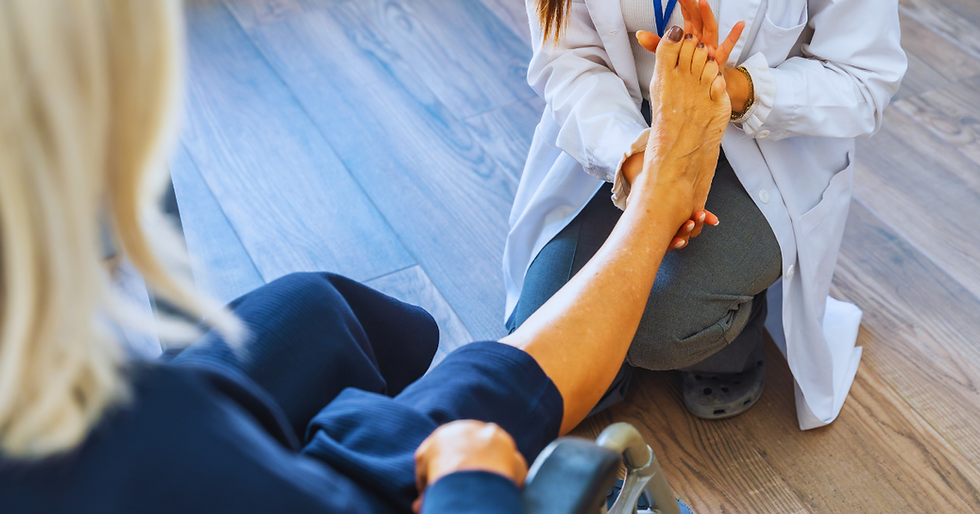Coronavirus: What You Need to Know
- Skilled Wound Care

- Mar 18, 2020
- 3 min read
Updated: Mar 23, 2020

We’ve all heard about the coronavirus and its current threat to the United States. We’re here today to talk about what it is, why there is a heightened risk to America’s elderly, and what care facilities can do about it.
This illness ranges from mild symptoms to severe illness. It’s important to note that not all symptoms emerge immediately. They can appear 2-14 days after exposure, according to the Center for Disease and Control. Those symptoms can look like a fever, cough, and shortness of breath.
What is Coronavirus?
COVID-19 was given its name late last year when an illness emerged caused by a novel coronavirus. It was found in Wuhan, China, and has since spread. It has been identified in more than 300,000 people worldwide, and there have been at over 35,000 cases here in the United States (updated 3/23/20). This illness ranges from mild symptoms to severe illness. It’s important to note that not all symptoms emerge immediately. They can appear 2-14 days after exposure, according to the Center for Disease and Control. Those symptoms can look like a fever, cough, and shortness of breath. (source)
This risk factor for the elderly is due to both the threat of age, and the fact that patients and residents are living in close proximity to each other.
What patient care facilities can do about it:
Officials are recommending that health workers separate the people who are sick vs. the people who are healthy, and also stay home if they are sick. Washing hands frequently and not touching your face can also help avoid illness. As far as the individual health centers go, healthcare professionals should remain in close contact with their local health officials so they know how to take appropriate action should the symptoms of coronavirus begin to appear. If there is evidence of community-wide COVID-19 illness, facilities are recommended to screen staff at the entry of the facility for symptoms, respiratory signs, and fever. There should also be daily temperature checks for residents as well as screening all visitors.

Here are some other steps you can take:
*The CDC is recommending that healthcare facilities wear a gown, gloves, facemask, and goggles or a face shield. This is also known as using Standard Precautions, Contact Precautions, Airborne Precautions, and Eye protection.
*Washing hands frequently with alcohol-based hand rub or soap and water. Make sure you’re washing for at least 20 seconds.
*Daily cleaning with an EPA-registered, hospital-grade disinfectant. This is to be used on commonly touched surfaces to decrease contamination.
*If a person meets the CDC definition of a suspected case and there is not an airborne isolation room available immediately, they are recommending that facilities place the person in a single room with the door closed until they can have a consultation with their local health department.
*Early detection is important. Being able to recognize potential outbreaks of all infectious illnesses in care facilities should be done through active monitoring and surveillance. There should already be a program in place that identifies cases, clusters, and outbreaks of disease.

Need more information?
If you’re looking to monitor the CDC COVID-19, you can check out their website by clicking here. You’ll find the latest information on coronavirus, how to prevent it, how to handle testing if you know someone who needs it, and recommendations for healthcare workers.
To learn more about the testing guidelines when someone is suspected to have COVID-19, click here.
Stay healthy!
Skilled Wound Care is a mobile surgical practice committed to transforming the chronic wound care model in nursing facilities. Wound care experts make weekly bedside visits to patients in long-term care facilities, avoiding transfers to hospitals or clinics. Our expert physicians give patients the most up-to-date and effective wound treatments, and educate facility staff on how to help patients continue to heal quickly and effectively between visits. This model of collaborative care allows SWC’s physicians to improve patients’ lives and health outcomes, to empower nursing staff, and to raise public awareness. Skilled Wound Care, along with its nurse and nursing home partners, is working every day to positively transform traditional nursing home wound care.




Comments